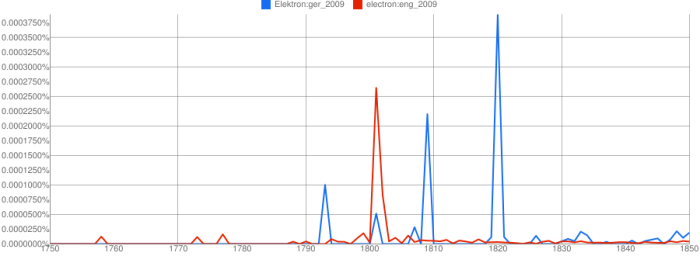Good evening Alexander,
It is Saturday. My tome concerning Gibb’s Paradox and Entropy is not finished yet, so here is a brief rambling concerning something that I have spent the last few hours playing with.
From Wikipedia:
In 1874 Irish physicist George Johnstone Stoney suggested that there existed a “single definite quantity of electricity”, the charge of a monovalent ion.
It wasn’t until 1894 that Stoney coined the term electron (a combination of the words electric and ion). Now this is according to Wikipedia’s, the ultimate source on everything, article concerning the electron. However according to the Oxford English Dictionary, OED, this original usage actually happened in 1891 (interestingly enough, Wikipedia cites the OED for their information—which is different by 3 years. Someone is wrong. Maybe Wikipedia isn’t so amazing…). The work, according to the OED, where the word electron first appears is as follows:
J. Stoney in Trans. Royal Dublin Soc. 4 583: A charge of this amount is associated in the chemical atom with each bond…These charges, which it will be convenient to call electrons, cannot be removed from the atom; but they become disguised when atoms chemically unite.
But let us be a little curious. What happens if we do a Google Ngram search on the word ‘electron’? To do this right we also need to do it for the German form of the same name ‘elektron’. A Google Ngram search is pretty cool, one of the things it tells you is the normalized frequency of words published in certain years as a percentage of apparently all the words published in that years (NB: this is actually a bit of a simplistic way of explaining what Google is doing). When you do that you see the following graph (this link takes you to an interactive version of the graph).

We see a big rise in the usage around 1900 (when quantum mechanics was nascent) and it peaks around the 1960s (when QED was pretty much hashed out). But we also see some interesting blips in the graph around 1713 and from around 1790 to 1820. What are these blips? Well let us look at plots from over those time periods.


According to Google there is an English spike in usage of the word electron in 1713, a German spike in 1793, English in 1801, German in 1809, and German again in 1819. Then Google reports peace on the electron front until 1899 (eight years after what OED reports to be the first usage of the word electron). One thing to note here is that this Google search is only good for books that google has perused and scanned. It may not be any good for scientific journals—I don’t know what all Google has perused.
It seems as if the word electron was used before OED and Wikipedia say. Moreover, when it was first used in book form it was used when the theory of electricity did not have a particle being responsible for electric charge, current, attraction, and repulsion but a fluid (or fluids for some theories)—the idea behind the word electron (an electric ion… think electric particle) hadn’t really existed in 1712 or in 1801.
Now this may just be noise in Google’s algorithms or scanning methods, but if it isn’t I am rather interested to know what the books are that provided those spikes in usage. Additionally, it seems very unlikely that noise in the data would happen for both the English and German forms of electron in the same rough time period.
I attempted to figure out how to coax Google books to tell me what books those words came from, however, I wasn’t able to succeed. Moreover, I don’t know how to even go about a quest to find out what works those words came from; so it seems as if my inquiry dies here.
I look forward to reading your post concerning permittivity and the likes—we both know I didn’t actually fully read any of the links that you posted. That would take all the fun out of you doing all the work behind understanding them.
—Darien
As a brief post script:
The below plot is identical in terms of original data content as the first plot in this post. However, all of the data is smoothed. You will note that there does not appear to be any usage of the word electron before the late 1870s. Thusly the interesting data spikes that formed the idea behind this post are easily smoothed into non-existence. We may use this as a great example as to the dangers of the smoothing of data.
